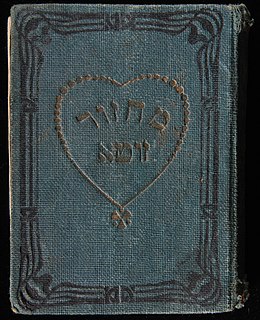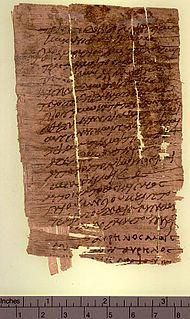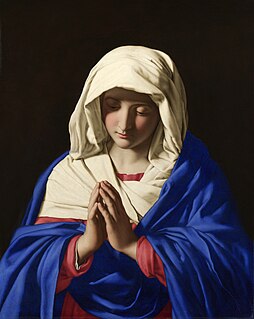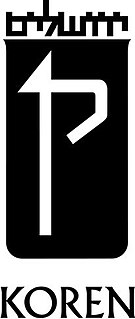Related Research Articles

The Lord's Prayer, also called the Our Father, is a central Christian prayer which, according to the New Testament, Jesus taught as the way to pray:

Prayer is an invocation or act that seeks to activate a rapport with an object of worship through deliberate communication. In the narrow sense, the term refers to an act of supplication or intercession directed towards a deity, or a deified ancestor. More generally, prayer can also have the purpose of thanksgiving or praise, and in comparative religion is closely associated with more abstract forms of meditation and with charms or spells.
A siddur is the Ashkenazi term for a Jewish prayer book, containing a set order of daily prayers. The word siddur comes from the Hebrew root ס־ד־ר meaning 'order'.
Aleinu or Aleinu leshabei'ach, meaning "it is upon us" or "it is our obligation or duty" to "praise God," is a Jewish prayer found in the siddur, the classical Jewish prayerbook. It is recited at the end of each of the three daily Jewish services and in the middle of the Rosh Hashanah mussaf. It is also recited following Kiddush levana and after a circumcision is performed. It is second only to the Kaddish as the most frequently recited prayer in current synagogue liturgy.
Kol Nidre is an Aramaic declaration recited in the synagogue before the beginning of the evening service on every Yom Kippur. Strictly speaking, it is not a prayer, although commonly spoken of as if it were. This dry legal formula and its ceremonial accompaniment have been charged with emotional undertones since the medieval period, creating a dramatic introduction to Yom Kippur on what is often dubbed "Kol Nidrei night", with the entire Yom Kippur evening service popularly called Kol Nidrei.

The machzor is the prayer book used by Jews on the High Holy Days of Rosh Hashanah and Yom Kippur. Many Jews also make use of specialized machzorim on the three pilgrimage festivals of Passover, Shavuot, and Sukkot. The machzor is a specialized form of the siddur, which is generally intended for use in weekday and Shabbat services.

The book of hours is a Christian devotional book popular in the Middle Ages. It is the most common type of surviving medieval illuminated manuscript. Like every manuscript, each manuscript book of hours is unique in one way or another, but most contain a similar collection of texts, prayers and psalms, often with appropriate decorations, for Christian devotion. Illumination or decoration is minimal in many examples, often restricted to decorated capital letters at the start of psalms and other prayers, but books made for wealthy patrons may be extremely lavish, with full-page miniatures. These illustrations would combine picturesque scenes of country life with sacred images. Books of hours were usually written in Latin, although there are many entirely or partially written in vernacular European languages, especially Dutch. The English term primer is usually now reserved for those books written in English. Tens of thousands of books of hours have survived to the present day, in libraries and private collections throughout the world.
The History of Marranos in England consists of the Marranos' contribution and achievement in England.
Lekha Dodi is a Hebrew-language Jewish liturgical song recited Friday at dusk, usually at sundown, in synagogue to welcome Shabbat prior to the evening services. It is part of the Kabbalat Shabbat.

Catholic Truth Society (CTS) is a body that prints and publishes Catholic literature, including apologetics, prayerbooks, spiritual reading, and lives of saints. It is based in London, the United Kingdom.

A prayer book is a book containing prayers and perhaps devotional readings, for private or communal use, or in some cases, outlining the liturgy of religious services. Books containing mainly orders of religious services, or readings for them are termed "service books" or "liturgical books", and are thus not prayer-books in the strictest sense, but the term is often used very loosely. Breviaries are prayer books used in many Christian denominations by believers to pray at fixed prayer times the canonical hours seven times a day, a practice that has its roots in Psalm 118:164. Throughout the year, and especially during certain seasons of the Christian liturgical kalendar such as Advent and Lent, many Christians pray a daily devotional, which contains a prayer for each day along with a reflection on a passage from the Christian Bible. A religion's scriptures might also be considered prayer books as well.

Johann Habermann, also Johannes Avenarius was a German Lutheran theologian.
John of Fécamp, was an Italian-Norman Benedictine who was the most widely read of early medieval spiritual writers before the Imitation of Christ became popular, during a period called the Golden Age of Monasticism and of Scholasticism, and the height of the Papacy. Writing under the name of famous writers, he wrote the very popular book Meditations of St. Augustine and the book Meditations. He was born near Ravenna and died at Fécamp Normandy, as the Abbot of the Abbey of Fécamp. He was nicknamed 'Jeannelin' or 'Little John' on account of his diminutive stature.
Gregory Bæticus was bishop of Elvira, in the province of Baetica, Spain, from which he derived his surname.

A libellus in the Roman Empire was any brief document written on individual pages, particularly official documents issued by governmental authorities.

In the Catholic Church, prayer is "the raising of one's mind and heart to God or the requesting of good things from God." It is an act of the moral virtue of religion, which Catholic theologians identify as a part of the cardinal virtue of justice.
Ashrei is a prayer that is recited at least three times daily in Jewish prayers, twice during Shacharit and once during Mincha. The prayer is composed primarily of Psalm 145 in its entirety, with Psalms 84:5 and Psalms 144:15 added to the beginning, and Psalms 115:18 added to the end. The first two verses that are added both start with the Hebrew word ashrei, hence the prayer's name.

Koren Publishers Jerusalem is an Israeli publisher of Jewish religious texts. It was established in 1961 by Eliyahu Koren, with the aim of publishing the first Hebrew Bible designed, edited, printed, and bound by Jews in nearly 500 years. It produced The Koren Bible in 1962, The Koren Siddur in 1981, and the Koren Sacks Siddur in 2009, in addition to numerous editions of these books and other religious texts in Hebrew, English, and other languages.
The embolism in Christian liturgy is a short prayer said or sung after the Lord's Prayer. It functions "like a marginal gloss" upon the final petition of the Lord's Prayer, amplifying and elaborating on "the many implications" of that prayer. In the Roman Rite of Mass, the embolism is followed by the doxology or, in the Tridentine Mass, by the Fraction.
The Libellus de locis sanctis is a 12th-century Latin guide book and travelogue of Palestine designed for the use of Christian pilgrims to the Holy Places. It "stands out" from the mass of medieval guide books "for its literary and informative qualities".
References
- 1 2 Susan Boynton, " LIBELLI PRECUM IN THE CENTRAL MIDDLE AGES", In: A History of Prayer, pp. 255–318, doi : 10.1163/ej.9789004171220.i-460.69
- A review of literature on libelli precum; includes influential references
- ↑ Libelli precum, In: Encyclopedia of the Middle Ages, 2005, ISBN 9780227679319
- ↑ Shahan, Thomas. "Pope St. Damasus I." The Catholic Encyclopedia Vol. 4. New York: Robert Appleton Company, 1908. 29 Sept. 2017